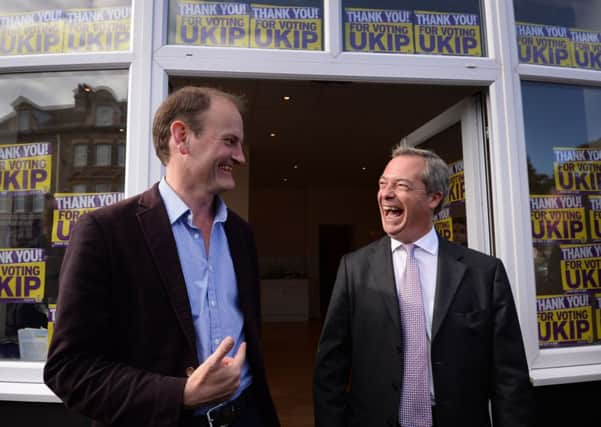Matthew Goodwin: The battle for power amid enigma of Ukip


Their sudden rise has already captivated our political debate. Back last May, Ukip became the first party other than the Conservatives and Labour to win a nationwide election since 1906.
The party’s call to leave the EU, end uncontrolled migration and reform Westminster attracted more than four million voters. Since then, Ukip’s revolt has continued to gather pace by winning two parliamentary by-elections in Clacton and Rochester and Strood, attracting over 40,000 members and averaging 16 per cent in the national opinion polls.
Advertisement
Hide AdAdvertisement
Hide AdUkip, the party that we were told would not survive the summer months, currently has around twice the level of support that it needs to significantly impact on the result of the election.
Ukip is already having a clear impact nationally but its presence in May will be felt most strongly in particular seats where support for Farage’s party is not following the national trend.
This is what makes Ukip’s effect so unpredictable. The party might be averaging 16 per cent nationally but it is polling far stronger in a cluster of seats, such as Castle Point, Clacton and Thurrock in Essex, Boston and Skegness in Lincolnshire, Rochester and Strood and Thanet South in Kent and Great Yarmouth in Norfolk.
A year ago the consensus was that Ukip could not win a single seat in the Commons. It has already won two through by-elections and now looks set to capture a handful more.
Advertisement
Hide AdAdvertisement
Hide AdSome in Labour point to the fact that most of these possible Ukip gains are in southern England and Conservative-held seats. But Ukip is also likely to emerge as the main alternative to Labour in dozens of seats in the North.
One example of what we might see is found in a poll from the Lancashire seat of Burnley where Ukip is in second place on 25 per cent without even trying. Expect to see lots of results like this in May.
Ukip has already demonstrated its ability to inflict damage in Labour-held seats like Heywood and Middleton, coming to within 617 votes of taking this core Labour heartland.
But Yorkshire, and especially South Yorkshire, is also very receptive to Ukip, which is why the party has been targeting the area in recent months.
Advertisement
Hide AdAdvertisement
Hide AdFor our book, Revolt on the Right, we ranked every seat across the country based on how favourable their local populations are to Ukip.
Douglas Carswell’s seat of Clacton, for example, emerged as the most favourable of all seats for Ukip because of its strong concentration of white, struggling and older voters who tend to support Ukip. Carswell went on to attract almost 60 per cent of the vote. But consider this; of the 100 most Ukip-friendly seats in the country 11 are in Yorkshire.
Barnsley East is the seventh most Ukip-friendly seat in the country, quickly followed by Ed Miliband’s Doncaster North (10th), Yvette Cooper’s Normanton, Pontefract and Castleford (12th), Wentworth and Dearne (18th), Barnsley Central (30th), Doncaster Central (32nd), Hemsworth (34th), Don Valley (43rd), Rotherham (66th), Scarborough and Whitby (87th) and Rother Valley (96th).
Big Labour majorities mean Ukip is unlikely to win these seats in 2015, but it is not difficult to see Farage’s party emerging as a major force in these seats and posing a major threat to Labour in the near future.
Advertisement
Hide AdAdvertisement
Hide AdAside from its political impact, what makes Ukip’s rise especially intriguing is how it has been followed by a wave of negative coverage about the party and its candidates. Each week brings new revelations about Ukip candidates and their toxic views about migrants, homosexuals and other minorities. It is worth noting that the same newspapers that spent the past 20 years telling voters that were right to feel anxious about immigration and angry towards Westminster are now attacking a party that has emerged to speak to these concerns.
But nonetheless, Ukip’s support has remained static. One possible reason for this resilience is that Ukip voters simply do not care.
London progressives collectively celebrate the negative stance toward Ukip without realising that it may only be entrenching opposition to the party among voters who were already the least likely of all to support Farage; university graduates, the under-35s, ethnic minorities, middle-class professionals and Londoners.
Meanwhile, our polarised debate might be hardening support for Ukip among other groups in society that have fuelled the party’s rise since 2010; older, white, financially struggling working-class men who feel intensely anxious about immigration, EU integration and the state of politics in Westminster.
Advertisement
Hide AdAdvertisement
Hide AdPoliticians have failed to grasp that Ukip supporters are driven more by values than a desire for certain policies. Their support reflects a deep and growing divide in Britain between those who have the skills and resources to adapt and thrive amidst the country’s economic and social transformation, and those who feel ‘left behind’.
The left behind look at a London-centric, highly educated and often sneering media and political elite and see a very different set of values reflected back: an endless celebration of rising diversity and cosmopolitanism; a heavy emphasis on London over the rest of the country; a language around immigration that talks only and robotically about its economic benefits which these voters do not feel; and a broad acceptance of EU integration while avoiding the one thing that would allow a national conversation about the pace and impact of this change – a national referendum.
Like them or loathe them, Ukip is mobilising these sharp social and value divides back into our politics. Our major parties have struggled to make sense of this revolt but they may be forced to ask some deeper questions in May.
• Dr Matthew Goodwin is co-author of Revolt on the Right: Explaining Support for the Radical Right in Britain (Routledge).